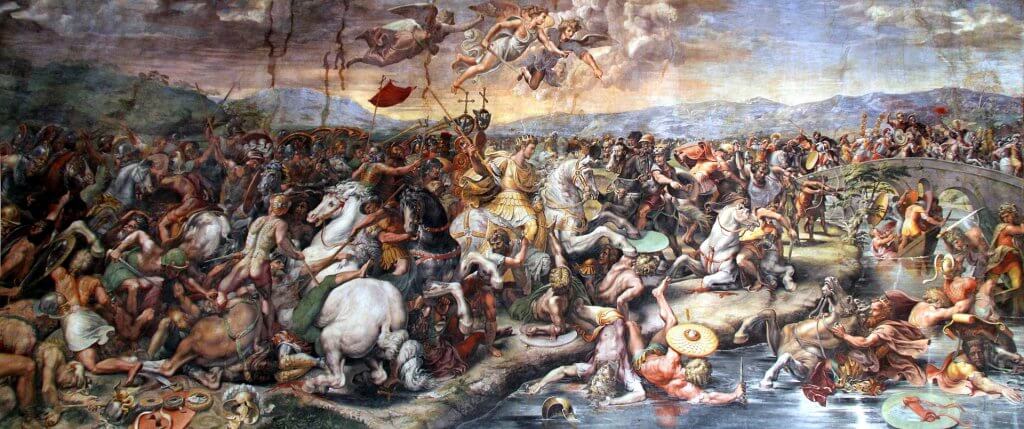On this day in 312 A.D., Constantine is said to have received the vision of the Cross.
 After the death of the Western Emperor Constantius, there was a struggle for succession. Constantine was one of Constantius’ sons, and his father’s troops proclaimed him Emperor. But the rules of succession at the time were not clear. But, while Constantine was in Gaul with his father’s troops, there were other contenders for the throne in other parts of the empire. One of them was Maxentius, who had set himself up as ruler in Rome.
After the death of the Western Emperor Constantius, there was a struggle for succession. Constantine was one of Constantius’ sons, and his father’s troops proclaimed him Emperor. But the rules of succession at the time were not clear. But, while Constantine was in Gaul with his father’s troops, there were other contenders for the throne in other parts of the empire. One of them was Maxentius, who had set himself up as ruler in Rome.
Constantine avoided an open challenge to Maxentius, but after repeated attempts by Maxentius to provoke Constantine, the latter marched toward Rome, defeating Maxentius in two battles on the plains of Italy. Finally, the two squared off on the banks of the Tiber River at the Battle of the Milvian Bridge. It is here, according to Eusebius of Caesarea and Lactantius, that Constantine had his vision.
Before this, Constantine was considering converting to Christianity, but was undecided. Here is the account for students in Memoria Press’ Famous Men of Rome:
One day, while he was in front of his tent with his offi cers and troops around him, he had a vision of an enormous cross of fire in the heavens. On one side of the cross were the words, in the Greek language: “By this, conquer.” The words are sometimes given in the Latin form In hoc signo vinces, the translation of which is “By this sign thou shalt conquer.”
Constantine was astonished at the wonderful vision, and he gazed at it until it faded away. He could not understand what it meant and was greatly troubled. But that night he dreamed that Christ appeared to him in robes of dazzling white, bearing a cross in his hands and that he promised Constantine victory over his enemies if he would make the cross his standard.
Constantine now declared himself a Christian and had a standard made in the form of a cross with a banner attached to it bearing the initial letters of the name of Christ. This banner was called the Labarum, and it was afterwards the standard of the Roman emperors.
If you have Latin students, ask them to parse the words in In hoc signo vinces, particularly signo and vinces. What case is signo? What tense, voice, and mood is vinces? How does the the mood in vinces affect how you translate the sentence?


